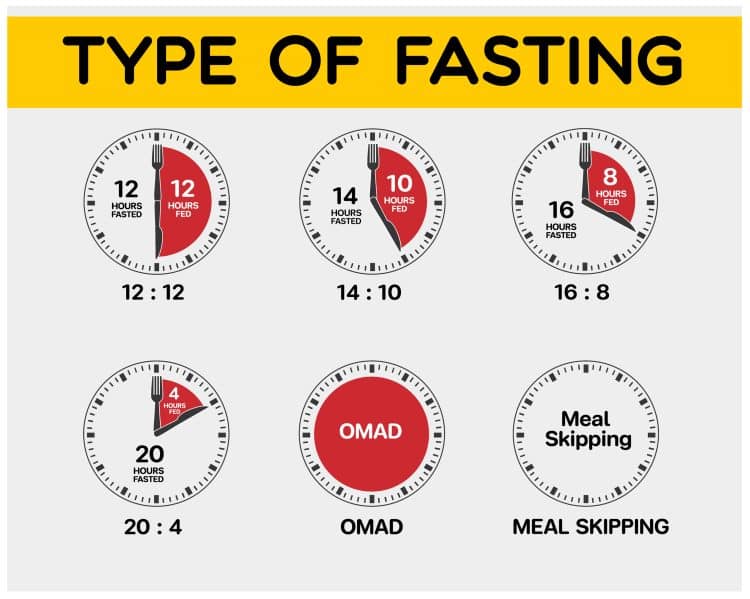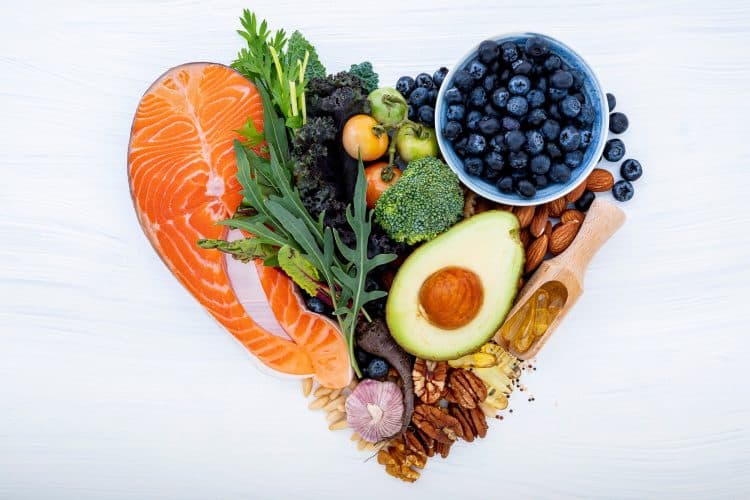Fasting has been a spiritual practice used for millennia to cleanse the mind and body. It has evolved beyond a mere ritual to become a proven method for enhancing the quality of life, reducing weight, and increasing life span.
Wholly or partially foregoing food intake for a certain period, followed by a gradual reintroduction of food, constitutes fasting or calorie restriction. The fasting duration is variable and can be between 12 and 40 hours. Potential health benefits of intermittent fasting include changes in gene expression and transient increase in human growth hormone (HGH). [1]
Attempting a fast without the correct knowledge might be challenging. Get the most out of your fasting plan using the science-backed advice from fitness experts explained in this article.
What is Fasting? How Can it Help with Weight Loss?

You could follow several fasting methods. They all revolve around juggling eating and fasting windows. A common strategy is to restrict one’s eating to a specific time frame, say eight hours a day, and then go without food for the rest of the day. Another way of fasting could be to skip two meals a couple of days a week.
One study found that those who followed an alternate-day fasting regimen significantly reduced total cholesterol and other heart disease risks [2]. Along with this, fasting has many potential health benefits.
Fasting is starkly different from the common habit of constantly snacking throughout the day. If you are in a prolonged calorie surplus due to eating three meals and a few snacks every day but don’t exercise, your body will store the excess calories as fat.
During a fast, your body starts burning fat. Fasting is effective for weight reduction since you consume fewer calories overall.
Tips For Fasting Safely
Fasting can improve health and quality of life, and contrary to popular opinion, it’s relatively easier to implement. The timing of one’s meals is key to enjoying fasting’s purported advantages. However, several nutritionists urge caution. Fasting can deliver several benefits, but only if approached the right way.
Studies have shown that fasting, as opposed to continuous calorie restriction, is more effective at reducing body and belly fat. [3]
Here are some tips you can follow to get the most out of your fast:
1. Identify Your Goals Before Fasting
When starting any diet or exercise program, figure out what works best for your lifestyle. Think about your daily routine and create a diet and eating schedule that fits. It’s also important to set realistic goals for yourself that you can meet. You’ll get frustrated if you try to accomplish too much at once.
2. Sticking To A Regulated Diet Even When You’re Not Fasting
Getting the most out of fasting requires attention to what you eat, even when you’re not fasting. You should also keep an eye on the food quality.

Combining fasting with a healthy eating plan can be effective. Nutritionists and dietitians advocate for a diet high in whole grains, lean protein, foods high in fiber, and fruits and vegetables. Fruits with a low glycemic index are recommended since they do not cause rapid blood sugar level increase. Maintaining a consistent blood sugar level is also critical for minimizing food cravings.
3. Pick A Fasting Plan That Suits Your Preferences
The amount of time needed to digest, absorb, and assimilate the previous meal varies from person to person but averages about eight hours. Even so, more than 8 hours are needed for the body to finish these procedures. Therefore, experts advise leaving at least 12 hours between meals for this detoxification process.
4. Drink Plenty of Water When Not Dry Fasting
You must ensure that you get enough fluids during a fast to prevent dehydration, which may cause weariness, dry mouth, thirst, and headaches.
The precise quantity of fluid you might need can be unique. It’s easy to get dehydrated when fasting since food provides 20–30 percent of the liquids your body needs. If you want to keep yourself hydrated, the general recommendation is to drink eight eight-ounce glasses (or around 2 liters) of fluid every day (the “8×8 rule”) [4].
Many people try to consume between two and three liters (8.5–13 cups) of water daily while fasting. However, pay attention to your body and drink when you feel thirsty.
5. Don’t Engage in Intense Exercise When Not Eating or Drinking
You can exercise while fasting, but there are several things you should keep in mind. Among them is doing the right workouts at the right time. For instance, experts recommend a moderate workout first thing in the morning when you’re still fasting.
6. Stop Fasting If You Feel Unwell
One must learn to listen to their body. Fasting causes physiological changes, and the body will respond accordingly. In the early stages of fasting, weakness, irritability, anxiety, dizziness, and an inability to focus are expected.
These are symptoms of starvation and undernourishment. Keep an eye out for these signs. It’s best to stop fasting and consult a doctor if these signs persist.

7. Ease into a Fasting Regimen
Fasting involves abstaining from eating and drinking for a set period. If you want to try fasting, ease into it by gradually reducing your caloric intake. This strategy could mitigate some of the adverse effects of fasting, such as dizziness, hunger, and lack of concentration. Not being as hungry during a fast may also make it easier to keep you going.
8. Go For Walks or Meditate
On fast days, it might be challenging to refrain from eating when you’re bored, hungry, or both. Keeping yourself occupied is an excellent method to avoid accidentally breaking your fast.
Walking or meditation are examples of low-energy-demanding activities that help take your mind off hunger. Keep your mind active by engaging in relaxing and non-stressful activities such as taking a bubble bath, reading a book, or listening to podcasts.
9. Don’t Break Your Fast with a Big Meal
After a time of deprivation, eating a lavish meal to celebrate may seem appealing. But you can feel sluggish and bloated if you break your fast with a huge meal. Also, binge eating might be counterproductive if you’re trying to lose weight.
Also Read: 7 Ways To Stop Binge Eating – For Good!
10. Plan Your Fasts
It’s human nature to want unhealthy foods like chips and soda after ending a fast. It is probably because processed fats and carbohydrates make meals addictive. To avoid making bad eating choices, plan your meals when you’re not feeling deprived or hungry.
Experiment With Different Fasting Schedules

There are several fasting schedules you can try to see what works best for your body, including:
1. The 5:2 Method (Fasting 2 Days Per Week)
In 5:2 plan, you’ll restrict your calorie intake to 500–600 per day for two days a week after eating normally for five days.
An individual can choose whichever two fasting days of the week they prefer. However, there should be at least one non-fasting day between them. On non-fasting days, it’s essential to stick to a regular eating schedule and avoid eating anything out of the ordinary, such as junk food. [5]
2. The 6:1 Method (Fasting For Only A Day In A Week)
Six days of three daily meals are followed by one day of fasting in the 6:1 intermittent fasting plan. Following this diet enables you to eat regularly six days a week before subjecting yourself to an intensive fast for one day. This approach of intermittent fasting can do wonders for your metabolism.
3. Eat, Stop, Eat (A 24-Hour Fast 1–2 Times Per Week)
You’ll abstain from consuming calories for 24 hours once or twice weekly on this IF program. You can have supper at 6:00 pm and then refrain from eating until 6:00 pm the following day, and you may do this once or twice a week, but not consecutively.
Remember: Although the possibility of rapid weight reduction is alluring, going without food for entire days is not healthy in the long run.
4. The 16:8 Method
Many people consider the 16:8 IF technique to be the most straightforward, practical, and effective strategy to lose weight and improve health in the long run.
Combine Fasting with a Keto Diet
You can enter ketosis more quickly by combining a ketogenic diet with intermittent fasting. Additionally, it may lead to rapid fat reduction. You can try different combinations to find what works best. However, before making any drastic changes to your lifestyle, it is best to consult your doctor.
Food Recommended During a Fast

Here are some broad food categories recommended for people who are fasting:
- Low-Carb Foods: Fasting and low-carbohydrate diets aim to reduce insulin and blood sugar levels, trigger ketosis, and boost fat burning.
- Low-Calorie Foods: Eating low-calorie foods during fasting can help keep hunger pangs at bay by keeping you satiated.
- High Protein Foods: You should be able to ingest enough protein to meet your daily needs in any intermittent fasting regimen. Sufficient protein for physical function and avoiding muscle atrophy can be obtained by eating 4-6 ounces of a complete protein source at each meal.
- High-Fiber Foods: Buckwheat flour has a high fiber content that assists the body in detoxifying. In addition, fiber helps stave off hunger, reducing the food cravings we experience while fasting.
Frequently Asked Questions
Is it true that fasting once in a while is beneficial for the body?
Fasting has more health benefits than just weight loss. It can improve your cardiovascular health and autophagy and make you an energetic and active person.
What is the best way for me to get used to fasting?
Slowly reduce your daily caloric intake to help your body adjust to fasting. Stay hydrated throughout the day and go for a walk or meditate. Eat plenty of whole foods each day to make up for lost calories. It may take two to four weeks for your body to adjust to fasting. However, stop fasting and eat a normal meal if you feel unwell.
Is fasting a risk to my mental health?
Fasting does not put your mental health at risk. On the contrary, it can help reduce anxiety in people who do it regularly.
Is it healthy to fast every day, like just eating once daily?
Fasting and calorie restriction have a range of health benefits. However, reducing one’s diet to an extreme, which might involve eating one meal per day for a long time, may cause a severe calorie deficit and do more harm than good.
Does intermittent fasting slow down metabolism over the long term?
As your body adjusts to a new eating pattern, your metabolism may eventually slow down if you go without food for an extended period.
Learn more about fasting
- 11 Best Intermittent Fasting Books in 2023 (Review and Ranked)
- 7 Day Water Fast: Your Journey to Rejuvenation and Wellness
- 6 Intermittent Fasting Juice Recipes: Sip Your Way to Success with These Tasty Recipes!
- Eat Stop Eat Intermittent Fasting Decoded: Master Your Metabolism & Lose Weight
- Intermittent Fasting for Weight Loss in Men — The Ultimate Guide
- Fat Loss vs. Weight Loss — Explained!
- Fruit Fasting: The Sweet Path to Wellness
- Foods To Avoid While Intermittent Fasting
Wrapping Up
Fasting is a personal choice that might be motivated by culinary or religious beliefs. It involves reducing your caloric intake by alternating between periods of eating and fasting.
You should set goals before you begin a fasting regimen. Staying healthy while fasting requires eating a balanced diet, reducing exertion, and drinking enough water. Use the expert tips mentioned in this article to get the best bang out of your fasting program.
References
- Health Effects of Intermittent Fasting: Hormesis or Harm? A Systematic Review – PubMed.” PubMed, 1 Aug. 2015, pubmed.ncbi.nlm.nih.gov/26135345.
- Effect of Alternate-day Fasting on Obesity and Cardiometabolic Risk: A Systematic Review and Meta-analysis – PubMed.” PubMed, 1 Oct. 2020, pubmed.ncbi.nlm.nih.gov/32777443.
- Effectiveness of an Intermittent Fasting Diet Versus Continuous Energy Restriction on Anthropometric Measurements, Body Composition and Lipid Profile in Overweight and Obese Adults: A Meta-analysis – PubMed.” PubMed, 1 July 2021, pubmed.ncbi.nlm.nih.gov/33293678.
- Drink at Least Eight Glasses of Water a Day.’ Really? Is There Scientific Evidence for ‘8 X 8’? – PubMed.” PubMed, 1 Nov. 2002, pubmed.ncbi.nlm.nih.gov/12376390.
- “Effectiveness of an Intermittent Fasting Diet Versus Continuous Energy Restriction on Anthropometric Measurements, Body Composition, and Lipid Profile in Overweight and Obese Adults: A Meta-analysis – PubMed.” PubMed, 1 July 2021, pubmed.ncbi.nlm.nih.gov/33293678.


